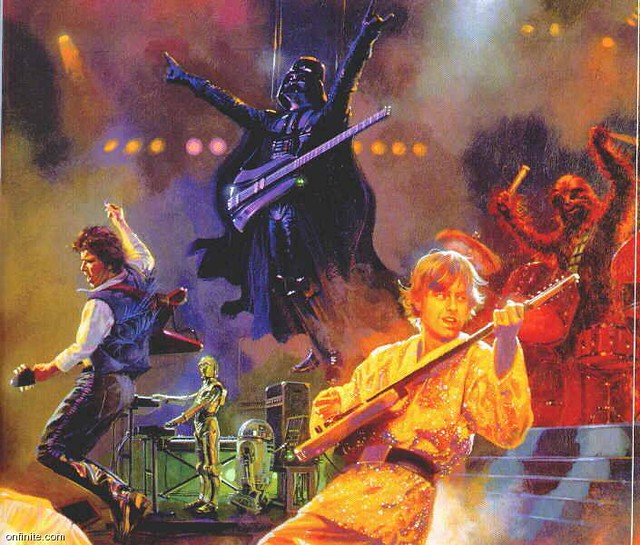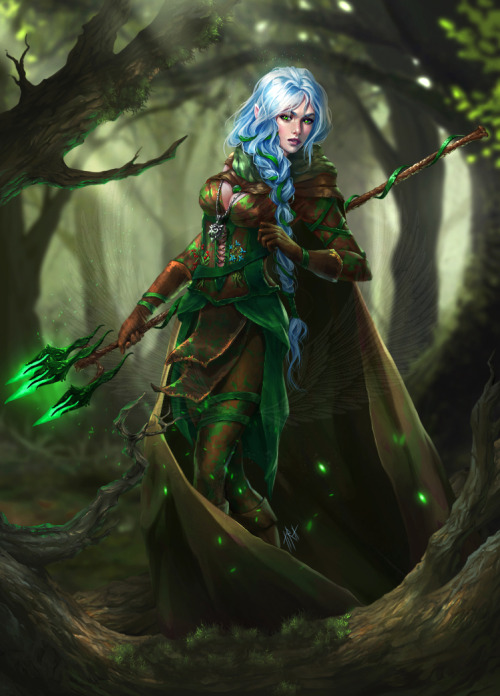"What truly is a role-playing game?"I don't think I'll ever have one, ubiquitous, empyrean answer because I don't believe that there is just one answer. In this week's post I want to delve into the meaning behind RPGs, specifically how it relates to character creation, the science behind making a good character, and hopefully throw out a few ideas to help make our characters more badass.

No, not that kind of badass!
Exhibit A
To begin, let's do a thought experiment. I want you to look at the pictures below, which are a sample of the different unit types from the video game Starcraft 2.

For many readers, I imagine that this is the type or style of character you are dreaming of when you begin your character creation process. Your adventurer is decked out in gear, looking like they've fought in a few warzones, and are relatively skilled or otherwise intelligent in their trade. If this is the intended result, then we must ask ourselves two questions:
- Do the current RPGs of today actually produce a character of our desired caliber?
- If not, what must we do to create such a character in our collective minds?
For the first question, I would argue that no, most modern (and old-school) games do not in fact give us characters like the above examples, for two primary reasons. Let's discuss.
1. Stories, not Numbers, are Badass
If we take Dungeons & Dragons as an example, especially the older varieties, what is the first step we're asked to perform (as players creating a new character)? Roll dice. That's right, roll 3d6 six different times to formulate a bunch of numbers for an array of basic "attributes".
Does that sound badass to you? Does a stat of 15 sound like something memorable, or make you want to make a movie out of, or hang a poster of on your wall? Probably not. Because numbers are just that: factual data that requires us to tap into a whole different region of our brain from that of the more emotional side that rejoices in badassery.
Does that sound badass to you? Does a stat of 15 sound like something memorable, or make you want to make a movie out of, or hang a poster of on your wall? Probably not. Because numbers are just that: factual data that requires us to tap into a whole different region of our brain from that of the more emotional side that rejoices in badassery.
This is where we have to define our definition of role-playing games, because I believe that at their core an RPG is an interactive story which requires two parts; interaction (which is governed by rules, mechanics and dice) but also story. We need equal parts game and equal parts role-playing. If we ignore role-playing, or the story/setting of an adventure for the rules of a game, we might as well play a board or card game instead. If we ignore character personality, background, talents, relationships, etc. for attribute scores; we're doing ourselves a disservice. Therefore, factors, such as the numerical value of a stat, should be kept in the background--especially during character creation--when we're trying to define who, truly, our character is going to be.
If we really want to rally behind the adventurer we're creating, we need to begin by telling the story of him or her. Who are they? Where did they come from? Was their family rich or poor? What profession did they take up? What motivates them? There seems to be 1,001 different facets to cover; which brings us to the second reason why modern RPGs don't create badass characters for us:
2. We, the Players, Suck at Being Badass
Rather, we're not very good at coming up with badass ideas for our characters. It's not that surprising, really. Most of us, especially the average tabletop player of today, are not full-time dedicated fiction writers. We're bakers, accountants, tradesmen, researchers and so on. Creating an in-depth, well thought out character is difficult! Especially if you're trying to design something "cool" on the fly with little to no inspiration to draw from.
This is why it's so important that game designers encourage players to tap into their creative side of thinking when designing a new adventurer. We can do this by offering tons and tons of inspiration. Ask the big questions about their characters. Get the players thinking of not only who their character is now, but who were they in the past, and how did they get to where they are today? You see, there's a treasure trove of information to build on in a character's background.
This is why it's so important that game designers encourage players to tap into their creative side of thinking when designing a new adventurer. We can do this by offering tons and tons of inspiration. Ask the big questions about their characters. Get the players thinking of not only who their character is now, but who were they in the past, and how did they get to where they are today? You see, there's a treasure trove of information to build on in a character's background.
Character Creation Redefined
Sadly, most RPGs treat backgrounds as a footnote. It's one of the last steps that we pay lip service to by saying something to the effect of "Create an awesome background! You can make it be annnyytthiinngg!" and end there. Gee, thanks game designer, you really inspired my inner badass (sarcasm)!
Let's re-build character creation from the ground up. I believe Traveller had it right, in that the focus should be on the character's past stories, and how those stories have created the character they are now. Don't just assign scores, give each of those scores a story. How did your buff warrior become so strong? Why did they take up warriorship? What campfire tales do they have to share?
The more answers we have to the questions about who our character is, the more of a badass they become. Suddenly your elf is not just an elf, they're an elf who's city was lost to a great flood, was forced to endure hardships until she settled in a distant city of mankind. She's naturally proficient in magic not "just because", but because she was trained by her grandfather (before the flood) then later was a protege to a minotarian mage before devoting herself to a deity and converting to become a templar for the local order.
"Not only do I look badass, I am badass!"
Breaking it Down
There is an unspoken agreement that the majority of adventurers begin their adventuring career at a young (but not too-young) age. Young of course is relative, since various demihumans live to be quite old in human standards (e.g. hundreds of years in age). But I'd say that most adventurers become young adults at the first 1/5 of their lifespan. If 80 years is the lifespan of a human, this is about the age of 16. The years before this are the adolescent or childhood years, and the second 20% of their lifespan (17 through 32 years for humans) is when they become true adults and take on a trade, profession, class or job. In otherwords, they become experts in a subject and excel at their career.
Yet all of these formative years are glossed over, or worse yet, completely ignored, when it comes to character creation. Most games are only interested in where a character is now, after all that growing, learning, exploring and career-building.
But doesn't all of that seem important? Take Batman for example. In his youth, his parents were murdered during a mugging and Bruce Wayne had to face his phobia of bats. This, in turn, guided his motives in life to end the crime spree in Gotham. In "the Dark Knight Rises", half of the movie is dedicated to this story. We see Bruce Wayne's ninja training, his going rogue from his master teacher, the formation of the batcave, batmobile and other technology, as well as his early career as a crime fighter. All of this is compelling, entertaining and establishes Batman as--you guessed it--a badass.
Example Badass
Let's say we want to make a special operations soldier. We'll use the Starcraft portrait on the top row, third from the left (a "terrain ghost" for those who play the game). Well, what does that look like? Again, I don't care about the numbers. What makes our character so good at what they do? We could say that he grew up on a border town, not far from the front lines of the humans versus the evil aliens. He joined the local law enforcement, and, for a number of years, worked as a SWAT-type marksman (let's give him a high WIS to reflect this), but then changed gears and was the chief instructor of a select cadre that taught self defense and martial arts to other enforcers. From there, he was drafted into the war and was a soldier for a numbers of years, serving as a sniper. Finally, he joined the elite "Raiders" squad that is tasked with sabotage and assault behind enemy lines.
Quite the background, don't you think? I haven't even used a single number or ability score, either, and we can already tell that this is a character that shouldn't be messed with, and probably excels with firearms and other ranged weaponry.
Conclusion
I hope future game designers will not only stop ignoring character backgrounds, but embrace them. I mentioned earlier that players are not good with coming up with compelling character backgrounds; that we all need a little help with our writing. As game designers, it's up to us to help inspire players. Offer them options to choose from, or plot ideas. Have the players answer some key questions regarding their character's past, personality and motivations.
Take a look at Ash's Guide to backgrounds and personalities for player characters. I'm sure you'll find it in-depth with a lot of ideas to think about. By the time you've filled out all the information listed there, you'll have a pretty deep character, which is turn allows you to roleplay him or her better, and affords your friends to play off your character badassery.


A great piece on rethinking character creation. Thank you for the food thought, and also the cross-links to other resources.
ReplyDelete